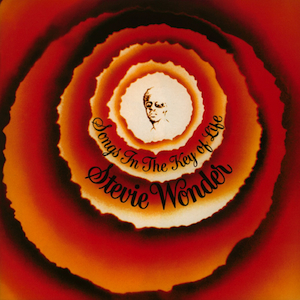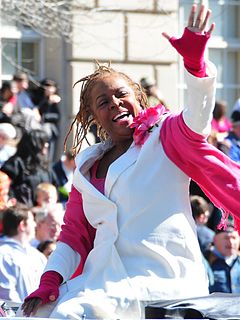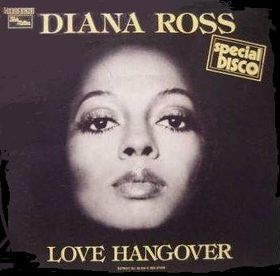
In number theory, a Gaussian integer is a complex number whose real and imaginary parts are both integers. The Gaussian integers, with ordinary addition and multiplication of complex numbers, form an integral domain, usually written as . This integral domain is a particular case of a commutative ring of quadratic integers. It does not have a total ordering that respects arithmetic.
The molar gas constant is denoted by the symbol R or R. It is the molar equivalent to the Boltzmann constant, expressed in units of energy per temperature increment per amount of substance, i.e. the pressure–volume product, rather than energy per temperature increment per particle. The constant is also a combination of the constants from Boyle's law, Charles's law, Avogadro's law, and Gay-Lussac's law. It is a physical constant that is featured in many fundamental equations in the physical sciences, such as the ideal gas law, the Arrhenius equation, and the Nernst equation.

In color theory, hue is one of the main properties of a color, defined technically in the CIECAM02 model as "the degree to which a stimulus can be described as similar to or different from stimuli that are described as red, orange, yellow, green, blue, violet," within certain theories of color vision.

The O'Jays are an American R&B group from Canton, Ohio, formed in 1958 and originally consisting of Eddie Levert, Walter Lee Williams, William Powell, Bobby Massey, and Bill Isles. The O'Jays made their first chart appearance with the minor hit "Lonely Drifter" in 1963, but reached their greatest level of success once Gamble & Huff, a team of producers and songwriters, signed them to their Philadelphia International label in 1972. With Gamble & Huff, the O'Jays emerged at the forefront of Philadelphia soul with "Back Stabbers" (1972), and topped the US Billboard Hot 100 the following year with "Love Train". Several other US R&B hits followed, and the O'Jays were inducted into the Vocal Group Hall of Fame in 2004, The Rock and Roll Hall of Fame in 2005, and the Rhythm and Blues Music Hall of Fame in 2013.

Songs in the Key of Life is the eighteenth studio album by American singer, songwriter and musician Stevie Wonder. A double album, it was released on September 28, 1976, by Tamla Records, a division of Motown. It was recorded primarily at Crystal Sound studio in Hollywood, with some sessions recorded at the Record Plant in Hollywood, the Record Plant in Sausalito, and The Hit Factory in New York City; final mixing was conducted at Crystal Sound. The album has been regarded by music journalists as the culmination of Wonder's "classic period" of recording.

Thelma Houston is an American singer. Beginning her recording career in the late 1960s, Houston scored a number-one hit record in 1977 with her recording of "Don't Leave Me This Way", which won the Grammy for Best Female R&B Vocal Performance.
Harold Melvin & the Blue Notes were an American soul and R&B vocal group. One of the most popular Philadelphia soul groups of the 1970s, the group's repertoire included soul, R&B, doo-wop, and disco. Founded in Philadelphia, Pennsylvania in the middle of the 1950s as The Charlemagnes, the group is most noted for several hits on Gamble and Huff's Philadelphia International label between 1972 and 1976, although they performed and recorded until Melvin's death in 1997. Despite group founder and original lead singer Harold Melvin's top billing, the Blue Notes' most famous member was Teddy Pendergrass, their lead singer during the successful years at Philadelphia International. The remaining members of the Blue Notes have reunited for Soul Train Cruises in 2013, 2015, and 2017.

Narada Michael Walden is an American musician, singer, songwriter and record producer. He acquired the nickname Narada from Sri Chinmoy.

"Love Hangover" is a song by the Motown singer Diana Ross, recorded in 1975 and released as a single on March 16, 1976. It rose to number one on the Billboard Hot 100 and Hot-Selling Soul Singles. It also hit number one on the Record World disco charts.

"Shop Around" is a song originally recorded by the Miracles on Motown Records' Tamla subsidiary label. It was written by Miracles lead singer Smokey Robinson and Motown Records founder Berry Gordy. It became a smash hit in 1960 when originally recorded by the Miracles, reaching number one on the Billboard R&B chart, number one on the Cashbox Top 100 Pop Chart, and number 2 on the Billboard Hot 100 chart. It was the Miracles' first million-selling hit record, and the first-million-selling hit for the Motown Record Corporation. This landmark single was a multiple award winner for the Miracles, having been inducted into the Grammy Hall of Fame in 2006, inducted into The Rock and Roll Hall of Fame as one of The 500 Songs That Shaped Rock and Roll, and honored by Rolling Stone as #500 in their list of The 500 Greatest Songs of All Time, dropping it 5 spots from #495 in the 2004 version.

"You'll Never Find Another Love Like Mine" is a song written by Kenny Gamble and Leon Huff and performed by R&B singer Lou Rawls on his 1976 album All Things in Time. The song proved to be Rawls' breakthrough hit, reaching number one on both the R&B and Easy Listening charts as well as number four on the dance chart and number two on the US Billboard Hot 100. This was the first and only time that one of Rawls' records reached Billboard's pop Top Ten. It was the first big hit for Philadelphia International to feature the reformulated MFSB, after many of the original members left Gamble and Huff for better opportunities. The song started Rawls' live shows from 1977 on.

"The Thrill Is Gone" is a slow minor-key blues song written by West Coast blues musician Roy Hawkins and Rick Darnell in 1951. Hawkins' recording of the song reached number six in the Billboard R&B chart in 1951. In 1970, "The Thrill Is Gone" became a major hit for B.B. King. His rendition helped make the song a blues standard.

"Something He Can Feel" is a song composed by Curtis Mayfield for the 1976 motion picture Sparkle. The song, a love ballad in a Chicago-/Philly-soul style, became a number-one hit on the Billboard's R&B singles chart in the United States twice with two separate recordings: a 1976 version by Aretha Franklin from the film's soundtrack, and a 1992 cover by girl group En Vogue.

"Fly, Robin, Fly" is a song by the German disco group Silver Convention from their debut studio album Save Me (1975). Sylvester Levay and Stephan Prager wrote the song, and the latter produced it. "Fly, Robin, Fly" was released as the third single from Save Me in September 1975, peaking at number one on the United States Billboard Hot 100. Thanks to the success of "Fly, Robin, Fly", Silver Convention became the first German act to have a number one song on the American music charts. The song received a Grammy Award for Best R&B Instrumental Performance in 1976.

"Kiss and Say Goodbye" is a 1976 song by American R&B vocal group The Manhattans. It was written by group member Winfred Lovett, the bass singer and songwriter of the group, who did the song's spoken introduction. The song was recorded for the album The Manhattans, released in 1976 by Columbia Records, and was released as a single in March of the same year. "Kiss and Say Goodbye" became a worldwide success, appearing in the musical charts of countless countries, a Top 10 hit in many countries, including No. 1 in the US, Belgium, Netherlands, New Zealand, and in Europe (European Hot 100 Singles). With the exception of Adult Contemporary Chart, "Kiss and Say Goodbye" was ranked number 1 in US on all Pop Singles Charts and on all R&B Singles Charts. The song was one of the biggest hits of 1976 and of the 1970s.

"I'll Be Good to You" is a 1976 hit song by R&B duo the Brothers Johnson. George Johnson, one of the two Johnson brothers in the band, wrote the song after deciding to commit to a relationship with one woman, instead of dating several at a time. While George was recording a demo for the song, family friend Senora Sam came by and added some lyrics. Brothers Johnson producer and mentor Quincy Jones heard the song, liked it, and convinced George to sing lead on the finished track. Released from their debut album, Look Out for #1, it was a top-ten hit on the Billboard Hot Singles Charts, peaking at number three, and a number one song on the Billboard R&B Charts during the summer of 1976. The single was later certified gold by the RIAA.
"Just to Be Close to You" is a song by American R&B/funk band, Commodores, in 1976. Released from their album, Hot on the Tracks, it would become one of their biggest hits, spending two weeks at the top of the Hot Soul Singles chart and becoming their second Billboard Hot 100 top ten, peaking at number seven. The song was written and sung by Lionel Richie.

"Walk Away from Love" is a song recorded by American singer David Ruffin in 1975. The million-selling single, produced by Van McCoy and written by Charles Kipps, was number one on the US R&B Singles Chart for one week in early 1976, and crossed over to #9 on the Pop Charts. In Canada, the song peaked at #30.
"Summer" is a song by the band War, recorded on April 4, 1976 and released on June 21, 1976, midsummer's day, as a single from their Greatest Hits album in 1976. "Summer" peaked at number seven on the Billboard Hot 100 pop singles chart and number four on the R&B chart. The track peaked at number one on the Easy Listening chart and was one of three entries to make the chart.